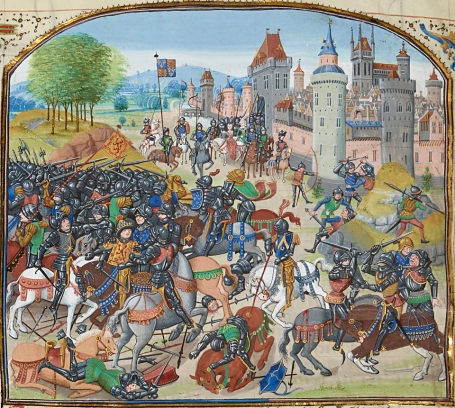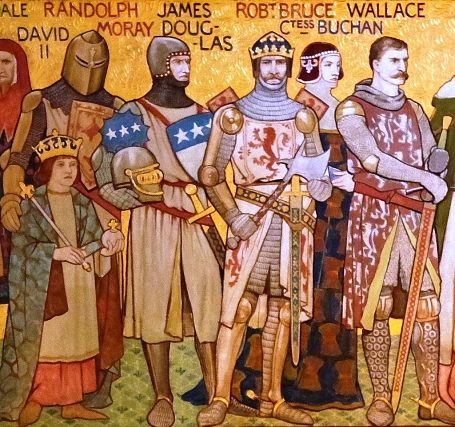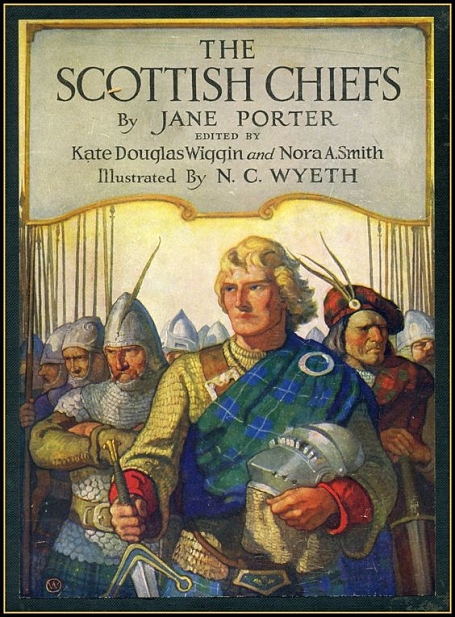The Life and Heroick Actions of the Renoun'd Sir William Wallace,
General and Governour of Scotland
by William Hamilton of Gilbertfield
Book XI, Chapter I (Continued)
The Battle of Falkirk
To the Tor-wood Wallace commands his Host,
Kierly and he march along Carron Coast.
A Party on the other Side they spy,
Bruce marching first, who does on Wallace cry.
"What art thou there?" "A Man," Wallace did say.
"Yes," said the Bruce, "that hast thou prov'd this Day.
Abide," he said, "thou need'st not now to flee."
Wallace reply'd, "It's not for fear of thee."
"To talk with thee," the Bruce said, "I desire."
"Say on," said he, "thou may'st for little Hire;
Ride from thine Host, let them abide with Beik,
I fain would hear what thou inclines to speak."
"What is the Cause," said Bruce, "thou wilt not cease
From bloody Wars, who mayest live in Peace?"
"It's thy own Fault," said Wallace, "be it known,
Who shamefully dost fight against thy own.
I claim no Right to rule, but to defend
My native Land, from Edward and his Men.
This Day thou's lost Two noble Knights and bold,
Worth more than Millions of the finest Gold;.
The Stuart stout, the gallant Graham and wise."
With that the Tears came trickling from his Eyes.
"Thou that shouldst be our true and Righteous King,
Destroys thy own, a cruel horrid Thing.
But 'gainst the South'ron, I must tell you Sir,
Come Life come Death, I'll fight with all my Birr.
"But wilt thou do as I shall Counsel give,"
Said Bruce, "and as a Lord thou mayest live
At thine own Will, and enjoy every Thing
In Peace, if thou wilt hold of Edward King?"
"No, No," said Wallace with Disdain and Scorn,
"I'd rather choose be hang'd upon the Morn.
The great GOD knows, the Wars I took in Hand,
Was to keep free what thou does now gainstand.
In cursed Time thou was for Scotland born,
O Rennagado, Faithless and Mansworn!
I vow to GOD, may I thy Master be,
In any Field thou shalt far rather die,
Than Turk or Pagan; this I shall keep good,
Thou grand devourer of thy native Blood."
Bruce smil'd and said, "With Pow'r you're overset;
You'll ne'er the upper Hand of Edward get."
Wallace reply'd, "This Day we're stronger far,
And I am sure much more expert in War,
Than when at Biggar, where he run for fear,
And left his Host, so doubtless shall he here.
Shall I leave Scotland now in such a Plight,
No Faith not I, till I redress its Right."
"Well," said the Bruce, "it now draws towards Night,
Will you meet me the Morrow when its Light
At Dunipace, and I do promise fair,
By Nine o' Clock to hear thy Council there?"
"No," Wallace said, "tho' Edward, had it sworn,
I'll have a Bout with him e'er Nine the Morn.
But if thou'll meet me at the Hour of Three,
By all that's good, I doubtless shall thee see."
Bruce promis'd with Twelve Scotsmen to be there,
Wallace with Ten, which both kept to a Hair.
Thus did they part, and Bruce rode on his Way
Near to Linlithgow, where King Edward lay.
Into the King's Pavilion then does get,
Where with the Lords he was at Supper set,
Bruce sitting down in his own vacant Seat,
Call'd for no Water, but went straight to Meat.
Tho' all his Weapons and his other Weed,
Were stain'd with Blood, yet he began to feed:
The South'ron Lords did mock him in terms Rude,
And said, "Behold yon Scot eats his own Blood!"
The King he blush'd at this so Home a Jest,
And caus'd bring Water to the Bruce in hast.
They bade him wash, he told them he would not,
"The Blood is mine, which vexes most my Thought."
Then did he sadly to his Mind recall,
And did believe what Wallace told him all.
With rueful Thoughts, the Bruce most sadly tost,
I leave; and follow Wallace to his Host.
The ballad, The Life and Heroick Actions of the Renoun'd Sir William Wallace, General and Governour of Scotland, by William Hamilton of Gilbertfield, 1722, is in the public domain.

The Kingdom of England and the Kingdom of Scotland fought dozens of battles with each other. They fought typically over land, particularly Berwick-Upon-Tweed, and the Anglo-Scottish border frequently changed as a result. Read more at Wikipedia.

The First War of Scottish Independence was the initial chapter of engagements in a series of warring periods between English and Scottish forces lasting from the invasion by England in 1296 ... Read more at Wikipedia.

Digitized version of The Scottish Chiefs, by Jane Porter, a novelization published in 1921 by Charles Scribner's Sons, about William Wallace and the First Scottish War of Independence. Read online at archive.org.